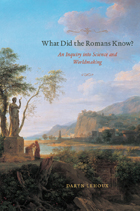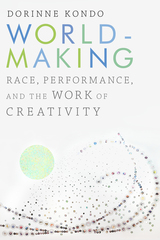2 books about Worldmaking

What Did the Romans Know?
An Inquiry into Science and Worldmaking
Daryn Lehoux
University of Chicago Press, 2012
What did the Romans know about their world? Quite a lot, as Daryn Lehoux makes clear in this fascinating and much-needed contribution to the history and philosophy of ancient science. Lehoux contends that even though many of the Romans’ views about the natural world have no place in modern science—the umbrella-footed monsters and dog-headed people that roamed the earth and the stars that foretold human destinies—their claims turn out not to be so radically different from our own.
Lehoux draws upon a wide range of sources from what is unquestionably the most prolific period of ancient science, from the first century BC to the second century AD. He begins with Cicero’s theologico-philosophical trilogy On the Nature of the Gods, On Divination, and On Fate, illustrating how Cicero’s engagement with nature is closely related to his concerns in politics, religion, and law. Lehoux then guides readers through highly technical works by Galen and Ptolemy, as well as the more philosophically oriented physics and cosmologies of Lucretius, Plutarch, and Seneca, all the while exploring the complex interrelationships between the objects of scientific inquiry and the norms, processes, and structures of that inquiry. This includes not only the tools and methods the Romans used to investigate nature, but also the Romans’ cultural, intellectual, political, and religious perspectives. Lehoux concludes by sketching a methodology that uses the historical material he has carefully explained to directly engage the philosophical questions of incommensurability, realism, and relativism.
By situating Roman arguments about the natural world in their larger philosophical, political, and rhetorical contexts, What Did the Romans Know? demonstrates that the Romans had sophisticated and novel approaches to nature, approaches that were empirically rigorous, philosophically rich, and epistemologically complex.
[more]

Worldmaking
Race, Performance, and the Work of Creativity
Dorinne Kondo
Duke University Press, 2018
In this bold, innovative work, Dorinne Kondo theorizes the racialized structures of inequality that pervade theater and the arts. Grounded in twenty years of fieldwork as dramaturg and playwright, Kondo mobilizes critical race studies, affect theory, psychoanalysis, and dramatic writing to trenchantly analyze theater's work of creativity as theory: acting, writing, dramaturgy. Race-making occurs backstage in the creative process and through economic forces, institutional hierarchies, hiring practices, ideologies of artistic transcendence, and aesthetic form. For audiences, the arts produce racial affect--structurally over-determined ways affect can enhance or diminish life. Upending genre through scholarly interpretation, vivid vignettes, and Kondo's original play, Worldmaking journeys from an initial romance with theater that is shattered by encounters with racism, toward what Kondo calls reparative creativity in the work of minoritarian artists Anna Deavere Smith, David Henry Hwang, and the author herself. Worldmaking performs the potential for the arts to remake worlds, from theater worlds to psychic worlds to worldmaking visions for social transformation.
[more]
READERS
Browse our collection.
PUBLISHERS
See BiblioVault's publisher services.
STUDENT SERVICES
Files for college accessibility offices.
UChicago Accessibility Resources
home | accessibility | search | about | contact us
BiblioVault ® 2001 - 2024
The University of Chicago Press









